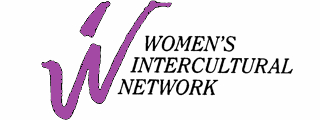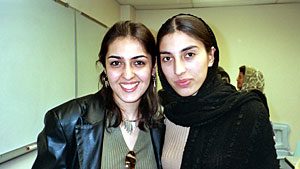
Behesta and Heba arrive at San Francisco airport.
Orientation and Reception by Afghan Community — Fremont, CA
Day Two
“Women as Peacemakers and Peacekeepers” The Women’s Building of San Francisco
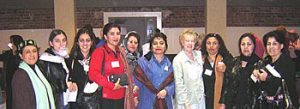
On International Women’s Day, in the Women’s Building in San Francisco, the Afghan Women’s delegation was received by women’s organizations and women leaders.
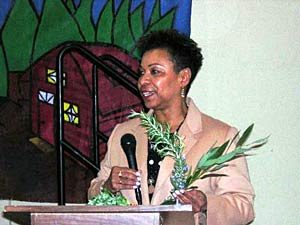
U.S. Representative Barbara Lee received the Circle Of Courage Award from the Women’s Intercultural Network.
Op ed article by Gwyn Kirk, Home Truths from our meeting at Mills College Leadership Institute and the Sunday IWD program
Below are four photos of the external murals on the Women’s Building.
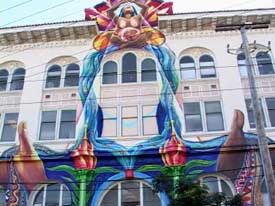
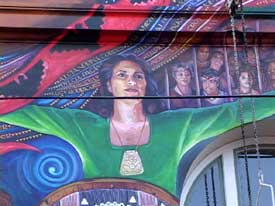
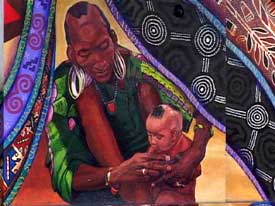
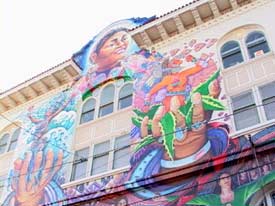
Day Three
San Francisco Meetings and Events
1) SF Bay Area Women Leaders in Health’ Violence Against Women/ Education/ Security/ Economic Justice
2) Planned Parenthood Golden Gate
3) Reception, Japanese Consulate General
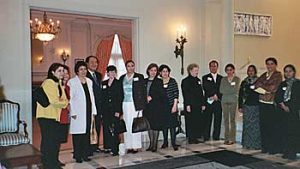
Calling the Circle at the Japanese Consulate General of San Francisco
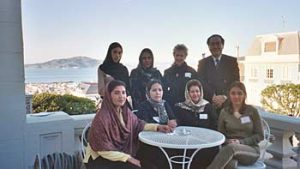
Afghan delegation with Con. Gen. Shigeru Nakamura, at San Francisco Japanese Consulate Residence
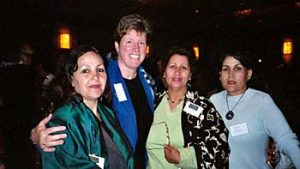
Raihana, Qudsia and Rona with Catherine Dodd, Planned Parenthood of Golden Gate.
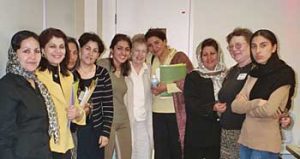
Opening dialogue at Planned Parenthood of Golden Gate, with Afghan and AWAI women and Bay Area women leaders Deborah Glenn Rogers, NOW and Kathie Pigallali, OWL
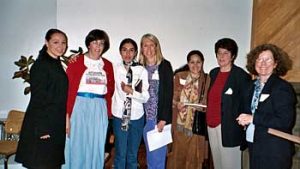
San Francisco State University women host the Afghan women at a women’s History Month event at the University Club.
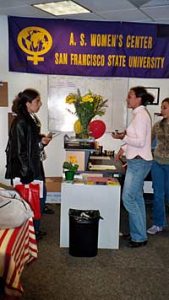
Heba and Raihana collected as much information and pamphlets as possible about running a women’s center
Day Four
Summary of Dialogue at Mills College
1)Dialogue with East Bay Area Women in Elected Office and Grassroots Organization Leaders, Mills College Leadership Institute, Oakland, CA
2) Conversation with SF women leaders, Carolyn Marks, host including SF Police Chief Heather Fong and the SF Fire Chief Joan Hayes White
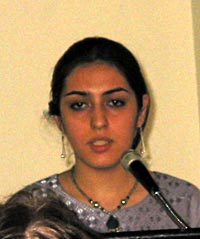
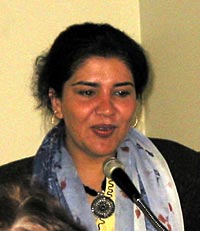
Kristi Schutjer Mance, J.D.
Co-Director
Institute for Civic Leadership
Afghan women would welcome:
* Continuing and building a relationship and network with US women.
* Assisting to write and publish (on the WIN web page) 1. the women’s stories about their experiences in Afghanistan and 2. information about the U.S. role/broken promises so that it can reach a wider audience. If at all possible, it would be ideal to work on this while the women are here, but could go on through e-mail, too.
* Assisting and advising re: marketing Afghan women’s goods in the US. (This may include connecting women who are producing goods with organizations like Global Exchange that are committed to fair trade; it could also involve getting MBA students to work with Afghan women (as a business school project) to develop markets, business plans, etc. projects; or it could mean enlisting the nonprofit division of a for- profit consulting firm to assist women on a pro bono basis with marketing, etc.)
* Political training to help women engage in electoral politics in Afghanistan. (Potentially organizations like Emily’s list, Emerge, the White House project could partner in this area.)
* Political organizing in this country to hold the US accountable for its commitments and responsibilities.
* Media training to help women work in print and broadcast media in Afghanistan.
* Computer training and support.
* Computers and other equipment. Specifically, Yasameen mentioned the need for laptops.
* Scholarships for women to study in the US.
* Funding for MANY things, including for a range of NGOs, for publishing magazines and supporting broadcast media, for health services, education, transportation, etc.
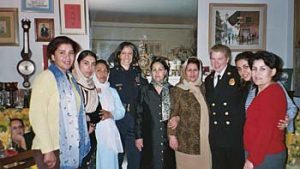
Calling the Circle at Carolene Marks’ with San Francisco Police Chief Heather Fong and Fire Chief Joann Hayes White.
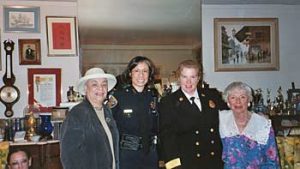
The Chiefs with Aileen Hernandez, CAWA State Chair and Carolene Marks, San Francisco Commission on Women.
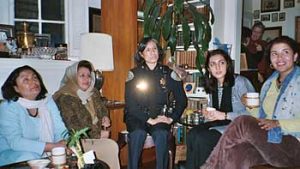
The Afghan delegation talks “infrastructure” with Police Chief Fong
Day Five
Welcome to Napa Valley
1) Napa County Tour
2)N.E.W.S: Women’s Shelter and Center
3) Calling the Circle of Community Women Leaders, Dinner
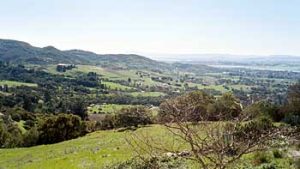
Welcome to Napa Valley
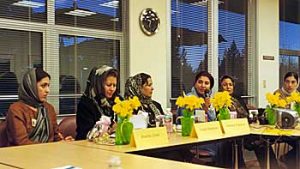
Afghan delegates on a Panel at the WEN Center in Napa
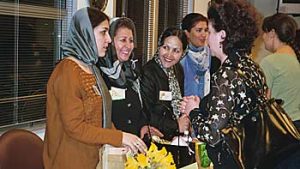
Afghan women enjoyed a buffet dinner hosted by California Women’s > Agenda, Suscol Intertriabal Council, AAUW and other local organizations
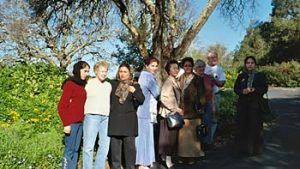
The delegation with WIN and AWAI women at Barbara’s house on the Mountain in Napa
Day Six
University of California at Davis
1) Establishing Women’s Centers and Shelters Training
2) Tea and Reception, American Women for International Understanding Davis
3)Conversations with elected women and supporters
4) Tour Un
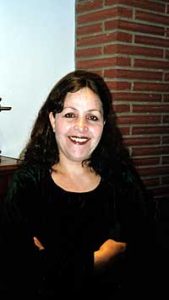
Raihana Popalzai, Dean of the Women’s Council and Dean of the Library, University of Kabul
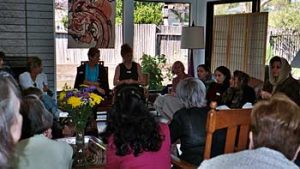
Calling the Circle in Davis, California, at lunch hosted by Joan Poulos, American Women for International Understanding (AWIU)
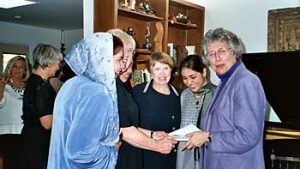
Meeting the Mayor of Davis, CA – former and incoming Mayors – all women!
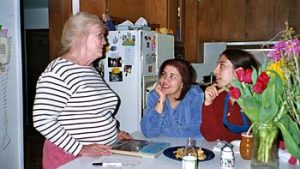
Joan Poulos reminisces about living in Kabul with Yasameen.and Heba.
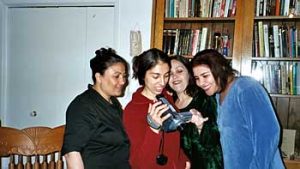
Heba – budding photo journalist
Day Seven
Drive to Los Angeles
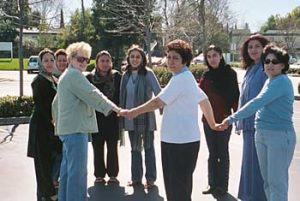
Calling the Circle in Central Calfiornia: AWAI, WIN and the Afghan women leave Davis for Los Angeles
Day Eight
Delegation at the Feminist Marjority, Los Angeles
1)Breakfast with Black Women for Wellness – Women’s health and vital services
2) Dialogue with LA Women’s Leadership
3)Evening in Hollywood!
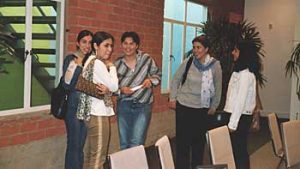
The Afghan delegation visited the Feminist Majority Foundation, Los Angeles, for a dialogue with the LA women¹s community
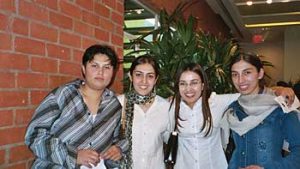
At the FMF, Wida Kozad (tour van driver), Behesta, FMF member and Heba
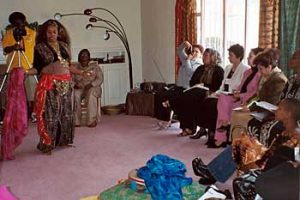
Calling the Circle with Black Women for Wellness, Los Angeles
BWW share their culture with the Afghan women with traditional belly dancing
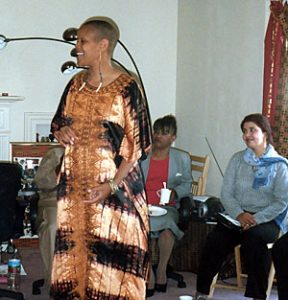
and spiritual readings
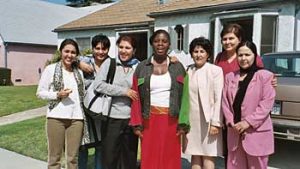
Jan Flint, Founder and Director, Black Women for Wellness, greets the Afghan women¹s delegation
Day Nine
Los Angeles
1) Brunch in the LA Afghan Community
2)”Human Rights for Women” , Program at UC Irvine
Day Ten
UC Fullerton, Visit to Women’s Center and Women’s Studies Department
1) UC Fullerton, Visit to Women’s Center and Women’s Studies
2) Coalition of Women from Asia and the Middle East
“What kind of person created this center – it is so organized, so clear, so well managed – we need these centers all over Afghanistan.”
Heba Tarzi
Afghan Women’s Network (AWN)
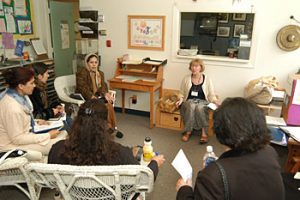
Visiting the UC Fullerton Women’s Resource Center – exchanging ideas on running a women’s center
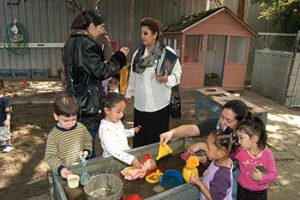
Visiting the UC Fullerton Child Care Center and learning that students volunteer at the Child Care Center
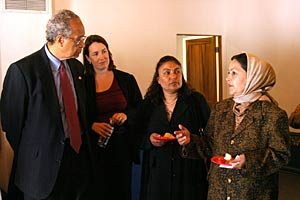
President Milton Gordon, UC Fullerton in conversation with Raihana Popalzai, Dean of the Women’s Council Center, U of Kabul, and on her right, Wahida Mirza Mahmmod, Welfare and Development Organization, Afghanistan.
Day Eleven
San Diego
1) Afghan women’s community Coconut Grove, San Diego
2) Foundation for Women
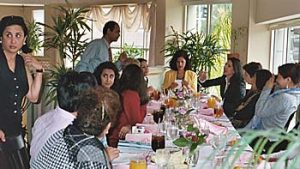
Afghan delegation is hosted at lunch by the Prasada Foundation and Indian women in San Diego
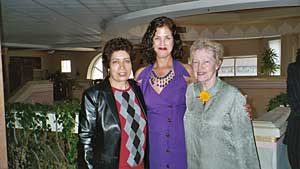
Kiana Ka¹ahanui, hosted in San Diego with the Foundation for Women, hosted the Afghan women
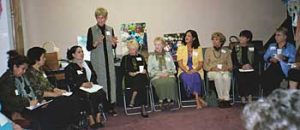
Calling the Circle with the Foundation for Women, a reception in San Diego
Day Twelve
San Diego: “Women in Politics: the Nuts and Bolts of Running for Elective Office” and Women’s History Project Reception
1)”Women in Politics: the Nuts and Bolts of Running for Elective Office”
2)Women’s History Project Reception
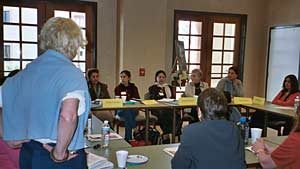
Dialogue at the Joan Kroc Center for Peace and Justice, “The Nuts and Bolts of Running for Office”, facilitating, Anne Hoiberg, NWPC, UNA-SD. Hosted by Dr. Dee Aker, Assistant Director, Kroc Center.
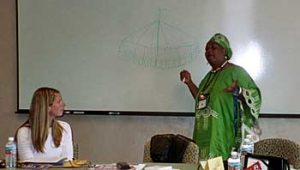
Diagraming a water purification system for the Afghan women that she is working with in Africa.
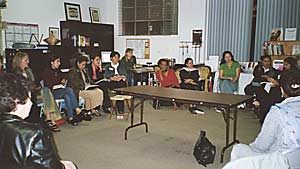
Calling the Circle at the Women¹s History Project, San Diego
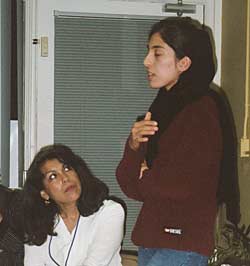
Heba Tarzi, Afghan Women¹s Network, speaking from the heart about Afghan women¹s struggles and hopes
Day Thirteen
Ojai and the California Coast
Ojai, California — Dialogue
2)Farewell to Raihana, Bhestha, and Wahida.
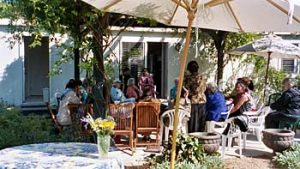
The garden party at Sue Broidy’s in Ojai, hosted by American Women for International Understanding (AWIU) and California Women’s Agenda (CAWA)
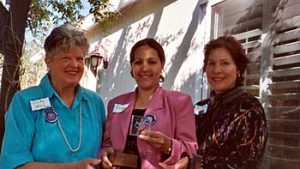
Judith Hill, President AWIU, Raihana Popalzai and AWIU member
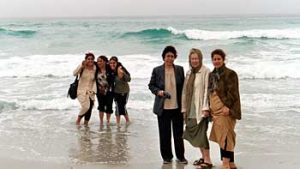
Afghan women test the waters in the Pacific Ocean
Day Fourteen
Santa Clara County Dialogue and Wrap up
Comments by Helen Young on the wrap up session with Afghan delegates
After the Afghan women had their lunch, Aileen Hernandez held a brief wrap-up session with them, and their closing remarks are ones I am sure will resonate with you.
They said that an important thing they learned from visiting women’s groups all over California was that women of all ethnic backgrounds could work together for a common cause. They said that when they return home, they will reach out to groups in other provinces that have large populations of Tajiks and Uzbeks and begin to work with them on women’s issues, because they now know that is the way for diverse groups to learn to love each other.
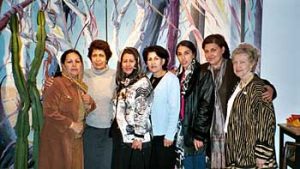
Closing the Circle at Rita Liang Guzman’s in Oakland
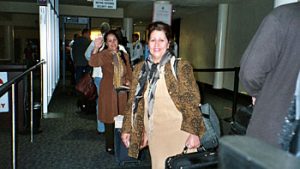
Farewell to the Afghan sisters!
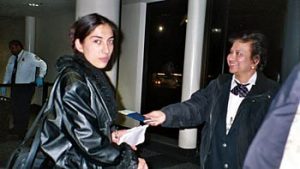
Heba’s journal before, during and after coming to the U.S.
The leadership exchange program was planned last year in 2002 when WIN and AWAI visited Afghanistan, while Ireen Lu worked in AWN Kabul office. Six women delegates went for this program. I would like to mention my feeling when I got the first email from Ireen that expressed I am selected from AWN to join this trip in USA. I was happy for the following points that I was considering before joining the trip;
> learning
> meeting different women around the world
>bring some programs in Afghanistan
> getting experience
I felt that for the purpose I am going I may know a lot about leadership but when I went and I came back I discovered how this trip played an important role in our official life as well as personal life.
This trip was also a good opportunity to get advantage of time to see the improvement of new technology in abroad. But the most important point that we went for was the leadership exchange program. The six afghan women who attended the leadership exchange program had different feelings from this trip as well as different bardasht {points of view} from each. The afghan delegates arrived in San Francisco on March 5th and were welcomed by some Afghan women and American women. It was such a nice feeling when we hugged them after passing such long distance. The delegation went step by step according the schedule. I never forget the meeting we had on March 7th in San Francisco Women’s Building and meeting Congresswoman Barbara Lee; and speaking on women’s issue. I was feeling so proud that I stood up behind the Microphone speaking on women’s issue with feelings to do some thing for women who suffer violence and cruelty since 22 years war. Meeting with the Feminist majority, I learned the most important tips of being a good leader. The delegation we had with the Black Women for Wellness, I discovered how the women put steps together beside men by struggling and working hard. The tour of Napa was the other major opportunity of learning, enjoying and getting ideas for our women’ programs in Afghanistan. When we met the American women working in shelter and the domestic violence, I again identified this that “Women can solve women’s problems” and this sentence just made me awake that I must do some thing for women!! Because the domestic violence is the major challenge against women now in Afghanistan. What I liked in this meeting was the structure of making the different laws after the general constitution for the government which helped them taking part in society.
I never forget the night we spent in Ms. Barbara’s house, and Charlie’s explanation about the Napa valley!!
The time we spent in Los Angeles and the night we had a dinner through (Chris who is Marilyn’s’s son). The meeting we had with Elahe Amani and visiting the Irvine university of California, Fullerton with the Iranian women.
—- The most important point that I emphasized on was the scholarship. We discussed this matter not only for the Kabul University but also for those young girls who need to study and work.
—- The meeting with Indian, Afghan and American women we had in San Diego + lunch in Indian restaurant. That was the time we met Miss. Kiana who housed one of the delegates too. We find her great!! The visit of the {Kroc} institute for peace and justice was one of the major activities due to the several points; such as meeting the women and learning good tips of how to start campaign for election if the budget is low. Also visiting the place and structure of the institute for the politics activities in the country.
The night we spend in Davis! It was one the most great and wonderful time in my life. Because we met an American woman, {Joan Poulos }who was just like an afghan American woman as she had spent much time in Afghanistan 24 years ago. She did a great hospitality for us.
The out put of this trip from my point of view;
Every one might have her own opinion toward this trip. Thus I want to mention what I have got. I would like to include all the things I got which may not or maybe very interested for the reader;
1. First of all it was interesting from when I traveled for the first time by plane so it was a good experience for me. When I was a child I was thinking how big a plane might be!
2. The women resource centers where I heard the idea of establishing and the funding system. I think this program will be the most important and good planning program in Afghanistan in future as it is need of women here.
3. I learned the leadership skill not only through theory but also practically when we met different leaders among Afghan women and American women.
4. Discovering how women in USA struggled to get their rights to abolish a male dominated society. We had another idea before! Like women in America had everything without any problem but now we saw that they suffered the same situation like afghan women are suffering now!
5. The system of practical work of students in university
6. The management system in the women center in university of California those students are working too. {work-study program}
7. Also the attitude of students with teachers whether it is an official atmosphere or friendly atmosphere. This attitude in Afghanistan education system is completely different.
8. The women history center in San Diego. I got this idea to establish a center to keep the heroic women stories and work activities.
9. The women centers inside of the universities made me amazed! It was a great idea to transfer it in Afghanistan as we need to have this for, many families don’t let their daughters to study due to the security problem inside of university as well as the violence which may happen against them.
10. A small point that was interesting for me was the attitude of every one with each other. I found devotion and a pure love among all people. When I was comparing, I identified that people are very patient and they behave good.
11. A good opportunity to meet afghan women in USA, the younger, the programs that afghan women are working there as well as visiting relatives too.
What I felt when I came back to Afghanistan;
—When we arrived in Kabul airport I felt different. I was happy to came back in my homeland and I just maintain this goal to do some thing for women whether through education, media, business or etc because I find my Afghan women the most poor and needy women around the world!!
—- when I evaluate my trip in my own mind, I felt that I should have brought a lot of things to USA for instance my business card, documentary films on women’s condition and etc, and I should have brought many thing from USA in Afghanistan. I missed a lot of thing here when I left and I missed a lot of things in USA when I came back. This is all a learning process for me to be more professional in future and be more careful in doing and saying any thing. Some times I feel that the way of participating in program was not as well from my side, but as I mentioned it was the first trip for me and the first time I met different place and people so it had an effect on me!
— Being not careful on picking the luggage because I put all my films that I video from the program and they all were damaged by lazer light during the luggage checked up!! And many other small points!!
But I am thanking of every one who assisted us in each step of this trip. I am thanking Marilyn Fowler the coordinator of this program and women’s circle in California (California Women’s Agenda) who just cared every thing!. I am thank full of Rona Popal the executive director of Afghan Women’s Association International coalition. Taiba Hussaini who traveled with us around and I never forget what she did professionally and personally her thought for me!
And I am thankful of all others who helped us and cooperated to have us in the USA for one month. I would refer a special thank to Marilyn Fowler who fundraised for the Circle and The Foundation for Women for getting lap tops for each delegate. We appreciate it!!
Thank you very much, Heba Tarzi (Media Officer in AWN)
Home Truths: Afghan women waiting for the U.S. to fulfill its promises Gwyn Kirk
Part of the justification for bombing Afghanistan “back to the Stone Age,” we were told, was to liberate Afghan women from the ultra-conservative Taliban regime. As these women cope with the grim aftermath of the bombing, our government, unfortunately, continues to add insult to injury.
At a State Department Reception on International Women’s Day (March 8, 2004) Secretary of State Colin Powell was upbeat about the Bush Administration’s “wide-ranging efforts” to “help the women of Afghanistan recover their rights” and to “allow them to participate in the future of their country.” He commended Congress “for the speedy enactment of the Afghan Women and Children Relief Act,” signed last December, and spoke of “resources and technical expertise for the education and training of Afghan women and girls.”
These past few days, representatives of Afghan women’s organizations told Bay Area audiences a very different story. Yes, in Kabul and other centers Afghan girls are allowed to go to school again. And some women, many of them widows and single parents, have paid work. But most girls must help their families to survive from day to day. They need scholarships to make education a real possibility. In rural areas, where various “warlords” prevail and continue to dispense their own gun-law, women still wear the burkha for safety. Many are afraid to leave their homes. Staff of non-profit organizations who travel outside the main cities to work on women’s projects also risk attack. Basic physical security does not exist.
People have no electricity. Many lack safe drinking water. Mothers agonize about how to provide enough for their families to eat, while thousands of children orphaned by war sleep in the streets and scavenge for food. After 25 years of constant conflict, people are exhausted and deeply traumatized. Their land has been reduced to rubble. There are no trees, no beauty, no way to really rest and relax.
After the defeat of the Taliban, several nations, including the United States, pledged their support to help rebuild Afghanistan. France, Germany, Japan, and Scandinavian countries are doing their part. But the United States is dragging its feet. Afghan women fear that the U.S. government, like our media, has forgotten them, moved on to other business, and abandoned them to a desperate situation. Less than half the money promised by the United States has arrived. Of sixteen women’s centers that were committed, only two have been established. Reconstruction has barely started.
Women need clinics. They need medicines and transport to get to the clinics. Rural women need buyers for their hand-made jewelry, bead-trimmed scarves, and embroidered skirts and tablecloths. Some need to learn to read and write. Others want to learn new skills: to work with computers, or to become tailors, midwives, nurses, journalists, radio and TV producers. Girls’ education was severely disrupted for over a decade and then totally banned. A whole generation has lost out on schooling.
Women also want training so they can run for political office and contribute their wisdom and experience to policy-making and legislative work. They want to learn about family planning and environmental restoration. They want resources for grassroots organizations that benefit ordinary women. Too much aid money is spent on salaries, Landcruisers, and big offices in Kabul-benefiting professional relief workers from abroad rather than local communities. They want liberation and they know it is still a long way off.
>Hearing these women’s stories gives us new information and new insights. They want us to share this news with everyone we know. They want people in the United States to hold our government accountable for its promises. Given the challenges they face, this is the very least we can do.
Gwyn Kirk
Gwyn Kirk is on the national board of Women’s Action for New Directions (WAND) Education Fund. WAND empowers women to act politically to reduce violence and militarism, and redirect excessive military resources toward unmet human and environmental needs.
